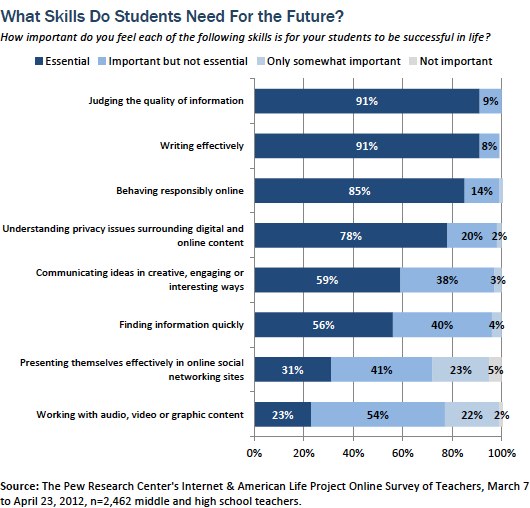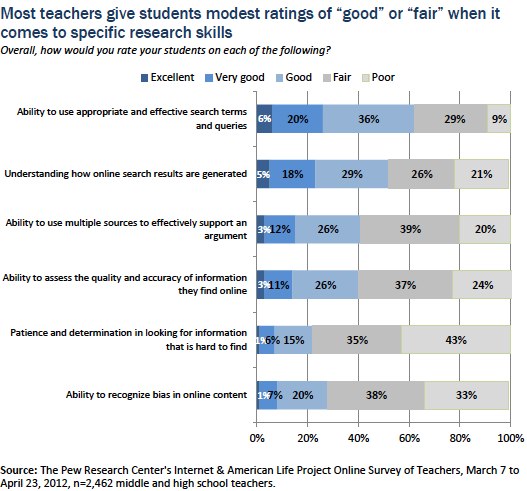
Research may be the most important skill our students need to succeed in the future, but studies suggests that even our most advanced students aren’t prepared enough in this area.
Since research is a key part of decision-making, you can see why this is an issue. If this trend continues, it could even be detrimental to our ability to compete with other advanced countries.
Let’s break down exactly why research skills are so essential, why our students (and teachers) are struggling, and two resources you can use to start teaching these skills in your classroom.
Why Are Research Skills Important for Students?
In preparation for this blog entry, I decided to investigate why it’s important for students to learn how to research.
My findings revealed things like “It’s a tool for gaining knowledge and making learning more accessible,” or “through research we can gather updated information and to-the-point data.”
Yet most of these responses fail to point out why learning to do research is such a fundamental knowledge base on which everything else relies so heavily.
One person who was able to articulate it brilliantly is Andreas Schleicher, the division head and coordinator of the Programme for International Student Assessment (PISA)—a test that assesses 15 year-olds’ ability to apply their reading, science, and math skills to solve problems.
In a video interview captured at a conference about the importance of teaching creativity and critical thinking in schools, Schleicher shares why these skills are even more essential today: “In the past … if you did not know the answer to a question you looked it up in the encyclopedia and could trust the answer to be true. Today when you look up your question in Google you may get 20,000 answers to your question and nobody tells you what is right or what is wrong, so you actually need the capacity to navigate ambiguity, triangulate knowledge, question the established wisdom of our time, not just reproduce it.”
Everything we’re learning relies on research, especially in today’s digital world.
Information is proliferating exponentially and the most important skill for our students to master is the ability to make sense of the data they get when researching a subject.
Why Are Our Students Struggling with Research?
A survey conducted by Pew Research in 2012 revealed that most teachers rate their students poorly on research skills, despite believing they are essential to later-life success.
The survey, which included responses from more than 2,000 middle and high school teachers from the Advanced Placement (AP) and National Writing Project (NWP) communities, pointed to specific deficits seen in today’s students.
Most notable among these is the inability to judge the quality of information, a skill the vast majority of teachers deemed “essential” for their students’ future success.

Teachers rate the importance of various skills to success later in life. (Source: Pew Research)
A majority of survey respondents also described their students as “fair” or “poor” when it comes to using multiple sources effectively to support an argument, assessing the quality and accuracy of information they find online, and recognizing bias in online content.

Teachers rate their students’ abilities on a variety of research skills. (Source: Pew Research)
These relatively low ratings of what are by and large honors and advanced students are indicative of a foundational knowledge gap found even in today’s top students.
If Teachers Know Research Is Important, Why Isn’t It Taught?
The issue with teaching research skills in schools is a matter of both when and who.
When asked when students should learn these critical research skills, many felt they should be taught as early as elementary school and students should already possess these skills by middle or high school, while others felt these skills should be taught later in a student’s career.
But when asked who should be mainly responsible for this part of the curriculum, some teachers openly acknowledged they don’t currently feel qualified to teach some of these skills.
This important survey tells us that even advanced students aren’t equipped to handle information in the digital age, and that teachers in general don’t feel prepared to teach them.
In response, the education system needs to create a research skills program starting in upper elementary through high school where these skills are studied and practiced every year. Of course, this must be accompanied by resources and training for our teachers.
Until then, a lack of research skills will be reflected in any report, journal, creative writing or project a student produces.
2 Excellent Resources for Teaching Research Skills
To kick-start this effort, we sought out the best online resources for teaching your students research skills. Try one of these before embarking on any assignment that requires research:
1. How to Teach Online Research Skills to Students in 5 Steps by Kathleen Morris
Kathleen is a blogger and primary teacher who is passionate about digital literacy. In her blog post and accompanying free eBook, she includes infographics and guides on how to research, use Google, and evaluate websites, as well as 50 ideas for research-related mini-lessons.
2. MLA Citations for Grades 1-6 by Kathy Shrock
Kathy provides detailed instructions for citing sources as early as first grade. This resource includes step-by-step guides and examples for sourcing all different types of media in MLA 9 format aligned with the abilities of students in grades 1-6.
How do you teach research skills in your classroom? Let us know in the comments below!
Ready to harness the power of PBL in your school or district?
